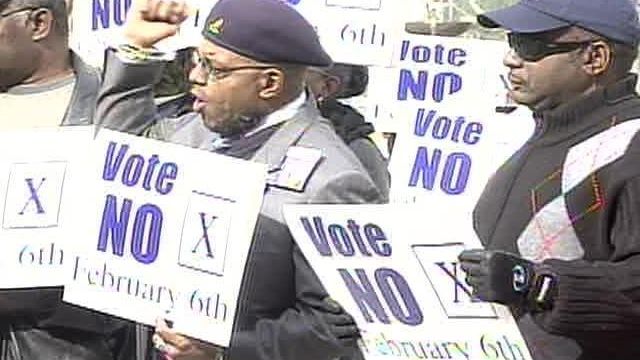Local News
Minorities Decry Fayetteville At-Large District Plan
Protesters rallied outside Fayetteville City Hall Tuesday afternoon in opposition to a proposal to change the way City Council members are elected.
Posted — UpdatedFAYETTEVILLE, N.C. — Protesters rallied outside City Hall Tuesday afternoon in opposition to a proposal to change the way City Council members are elected.
Local residents will vote in a Feb. 6 referendum whether to eliminate three single-member districts from the City Council and replace them with three at-large districts.
Four of the existing nine City Council districts have majority minority populations, and critics of the referendum said a shift to six single-member districts and three at-large districts would hurt minority representation.
The opposition rally Tuesday had the fervor of a tent revival. Speakers quoted from the Bible and spoke with the flair of preachers.
"A storm is indeed coming to Fayetteville," City Councilman Charles Evans said. "This storm threatens to destroy our identity and the tapestry that makes our neighborhoods unique."
The No 2 Referendum organization said at-large seats on the Fayetteville City Council historically haven't represented low-income and minority citizens well. Group members said the proposed at-large seats would result in some districts having two or more council members since at-large members can live anywhere in the city.
"You could have five people on a council of 10 from the same neighborhood," City Councilwoman Juanita Lopez said, including the mayor's position in her total.
But supporters of the new format, including Mayor Tony Chavonne, said that a City Council structure of six single-member districts and three at-large districts would encourage the council to take a big-view picture of Fayetteville. Current council members tend to focus too closely on issues affecting only their districts whiled disregarding issues that affect the whole city, they said.
"I see too much infighting, bickering," said Bill Crisp, a member of the Yes 2 Referendum Committee.
Crisp and other supporters also say at-large seats would make the council more democratic. Voters citywide would elect half of the City Council -- the three at-large members, their own district member and the mayor.
"This gives them a better voice in government by being able to hold them accountable," Crisp said.
Most major cities in North Carolina have at-large city council seats. Raleigh, Durham and Greensboro all have a combination of single-member and at-large districts, while all of Wilmington's council members are elected in at-large districts. Winston-Salem is the exception, with all seven seats serving single-member districts.
The U.S. Department of Justice would have to approve any change in City Council district lines in Fayetteville. Under the 1965 Voting Rights Act, changes can't negatively affect minority voting.
• Credits
Copyright 2024 by Capitol Broadcasting Company. All rights reserved. This material may not be published, broadcast, rewritten or redistributed.





